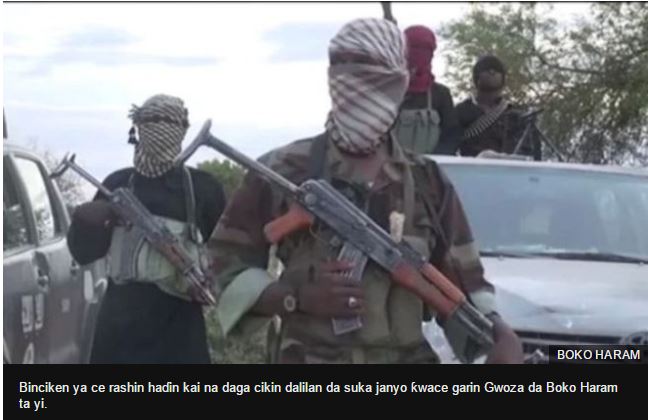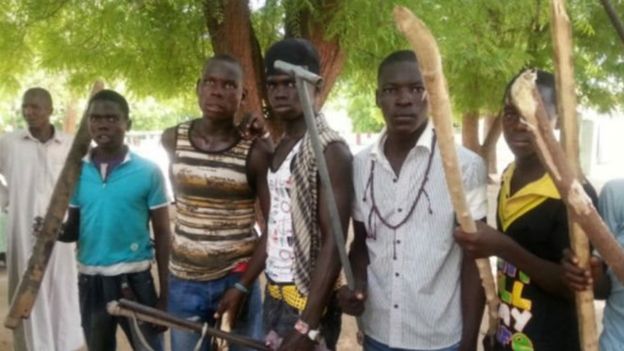
Garuruwan da suka iya wargaza shirin Boko Haram
Wata Æ™ungiya mai taken Cibiyar bunÆ™asa fasahar sadarwa da ci gaban Æ™asa (CITAD) ta wallafa wani bincike kan yadda wasu al’ummomi a Najeriya suka yi nasarar wargaza aniyar Boko Haram na mamaye musu yankuna.
Binciken wanda aka shafe tsawon shekara biyu ana gudanarwa, ya gano cewa sai bango ya tsage Æ™adangare ke samun wurin shiga. Ya ce haÉ—in kai a tsakanin irin waÉ—annan al’ummomi ya zama babban makami na tunkarar Æ™ungiyar Boko Haram har ma da yin nasara a kanta.
Manufar binciken a cewar daraktan cibiyar, Yunusa Zakari Ya’u, ita ce kyautata haÉ—in kai tsakanin jama`a ta yadda za su guje wa faÉ—awa irin masifar da rikicin Boko Haram ya haddasa.
“Mun yi la’akari da cewa mutane ko kuma al’umma su ne ginshiÆ™in tsare kansu.”
Ya zayyana Æ™oÆ™arin al’ummomin garuruwa irinsu Biu da Gombi da Azare da unguwar Gwammaja a jihar Kano a matsayin abin misali ta fuskar wannan haÉ—in kai.
 Hakkin mallakar hotoAP
Hakkin mallakar hotoAPYa ce: “Idan ka É—auki waÉ—annan wajaje, wajaje ne da ko dai sun hana ‘yan Boko Haram su shigo su yi É“arnarsu, ko kuma lokacin da suka shigo an fatattake su, an kore su.”
A cewarsa sun kuma ga yankunan da ba su yi irin wannan jajircewa ba, lamarin da ya kai ga cin galaba a kansu.
“In ka É—auki su Mubi da Gwoza da Bama da Yadi Buni, waÉ—annan wajaje ‘yan Boko Haram sun shiga, wasu wajajen har sarakunansu ma suka gudu ba ma mutanen ba.”
Ya ce a duk lokacin da ka samu al’umma kanta ba haÉ—e yake ba, to ba za ta iya tunkarar masifa irinta Boko Haram ba.
Yunusa Ya’u ya ce a wasu wuraren, sun tarar cewa rashin haÉ—in kai tsakanin jami’an tsaro da al’umma ya haddasa ta’adi mafi muni daga Æ™ungiyar.
A cewarsa har yanzu, mutane ba su karÉ“i saÆ™on nan da ke cewa ‘É—an sanda abokin kowa’ ba. Hakan ta sa lokacin da Boko Haram ta fara kai hari kan jami’an tsaro wasu mutane a wasu wurare har murna suke yi.
Ya ce hakan ya sage gwiwar jami’an tsaron ta yadda a lokacin da Boko Haram ta auka wa mutanen gari, su ma jami’an tsaro “suka riÆ™a noÆ™ewa.”
“Idan ka É—auki Gwoza a jihar Borno, shi ne rabuwar kai kan bambancin addini wato tsakanin farko kowannensu yana ga idan Boko Haram ta auka wa wancan, ba shi akai wa ba, ba zai kawo gudunmawa ba. Daga baya dukkansu kuma wutar ta ci su.”
Haka kuma “A Bama, bambancin tsakanin É—ariÆ™oÆ™i ne, in ji Yunusa Ya’u.”
Don haka ya buÆ™aci gwamnati da al’umma su kyautata jajircewa don gudun kada masifa irinta Boko Haram ta zo ta shafe su.

